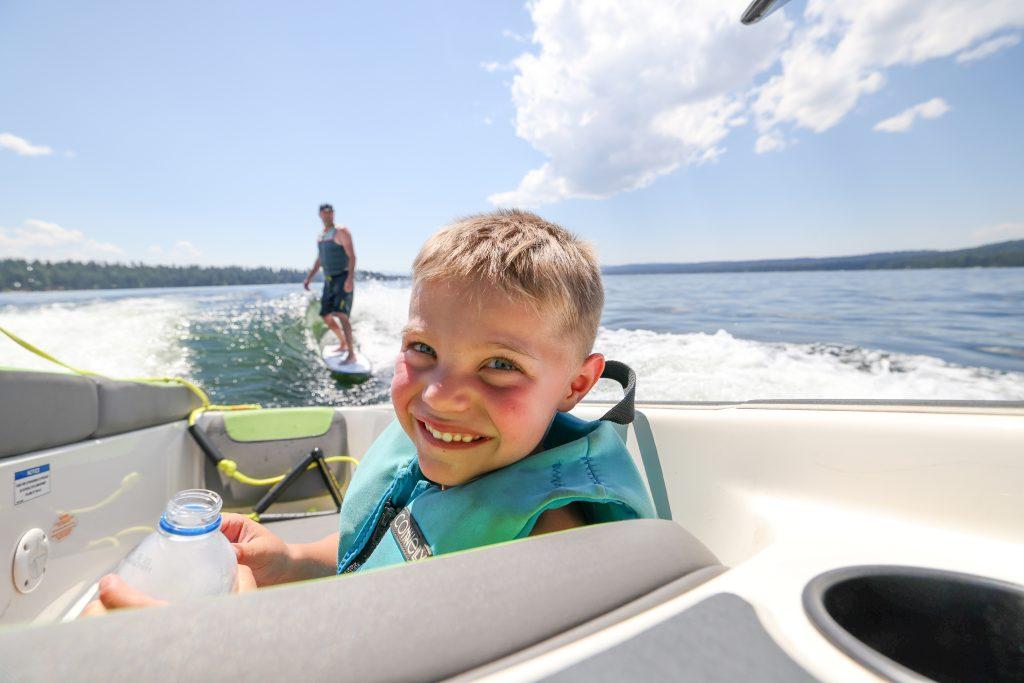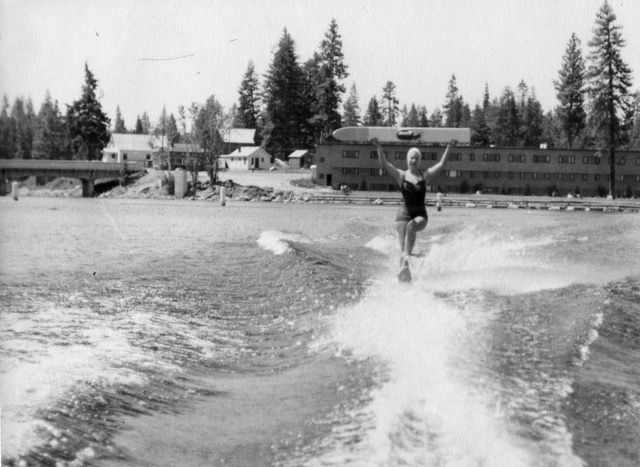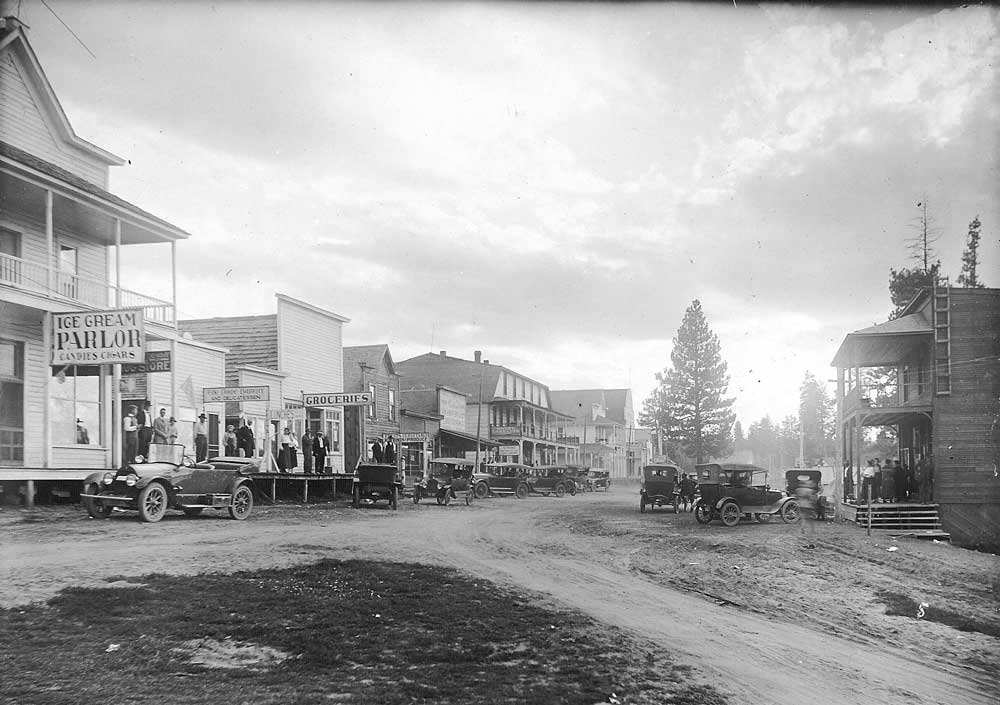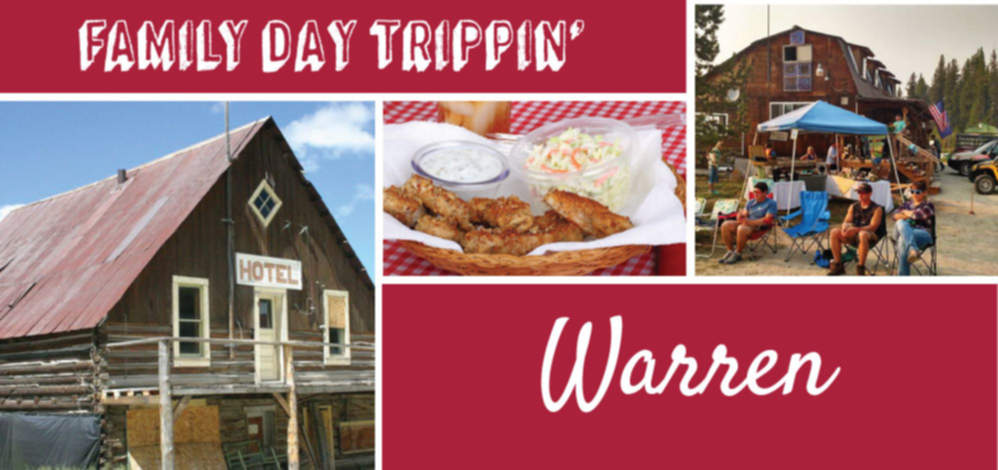By McKenzie Kraemer
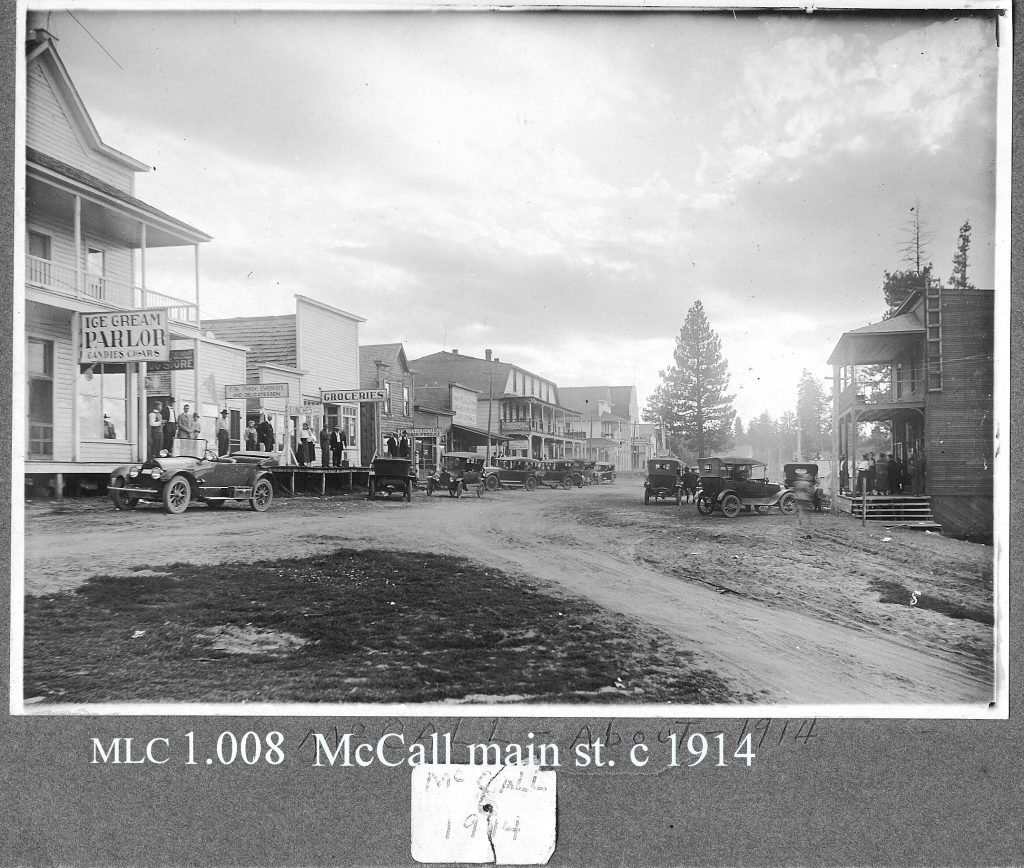
Before the ski traffic and the souvenir shops, before summer crowds strolled the lakefront snapping pictures with their phones, McCall was built on the hard work and grit of homegrown businesses. These were ventures rooted in practicality and pride – general stores, cafes, hardware shops, and lakeside camps that served the needs of a growing McCall community.
McCall looks a little different now, but its character still echoes the early days. The corner café, the dependable hardware store, the familiar storefronts along Lake Street – they’re the descendants of the visionaries who built something from nothing. And while the names may change and the buildings may shift, the heart of McCall remains rooted in the same values: hard work, hospitality, and a deep love for this place by the lake.
Take a step back in time with us as we share some of the early businesses in McCall – a few you may even recognize today!
Shaver’s: The Heartbeat of Lake Street
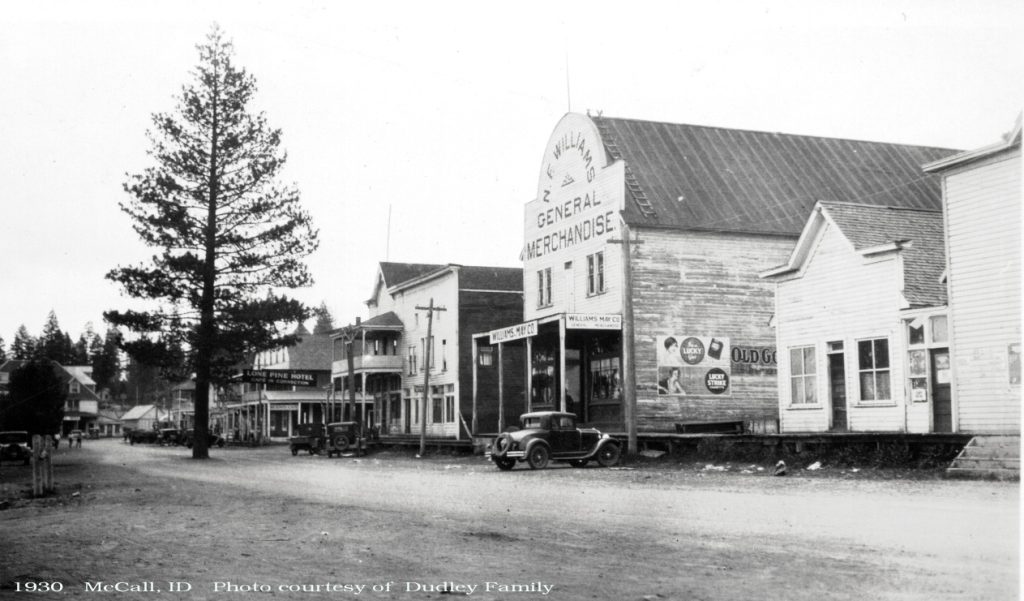
Long before Ridley’s and Albertson’s, there was Shaver’s – a store with roots stretching back to McCall’s very beginning. What started as a modest general store in the late 1800s evolved over more than a century, growing and shifting alongside the community it served.
The story began in 1902, when N.F. Williams opened the Williams General Store, a vital source for everything from boots and dresses to dry goods and groceries. By 1924, it had evolved into Williams & May, known especially for its selection of family clothing and footwear. Then in 1935, Herman Stockwell and Frank Davidson took over, rebranding it as Stockwell’s and placing the store under the stewardship of longtime manager Wendell Gillespie. A fire in 1940 threatened its future, but the store came back stronger, reopening in a new brick building on New Year’s Day 1941.
In the 1950s, Carl Shaver, who had already opened a successful store in New Meadows in 1941, brought his name and vision to McCall. Under his leadership, Shaver’s expanded to occupy an entire city block. The store took over the site of the old Idaho First National Bank and became the largest retail operation in Valley or Adams County. Known for its old-West flair, Shaver’s even incorporated barnwood salvaged from an 1880s structure. And during a renovation, workers uncovered a stash of old moonshine buried beneath the site of the former McCall Saloon. Just one more colorful chapter in the store’s long story.
Today, the original “Shaver’s block” is home to modern-day landmarks like the Manchester Ice Rink at the intersection of E. Lake Street and 2nd Street. In 2001, Shaver’s was purchased by Ridley’s Family Markets and relocated, but the echoes of its century-long legacy remain right in the heart of downtown McCall.
Hotel McCall: A Century of Lakeside Hospitality

Perched on the corner of the dogleg through downtown with postcard views of Payette Lake, Hotel McCall is more than just a place to stay – it’s a living piece of McCall’s history. From its early days under the stewardship of Mrs. Wm. M. Deinhard in 1922, the hotel earned a reputation for warm hospitality and forward-thinking amenities, boasting 25 rooms with hot and cold running water, a rare amenity in those days!
That spirit of welcome endured even after tragedy struck in the winter of 1937, when the hotel was destroyed by fire. By 1938, it rose again, rebuilt on its original site and soon reclaimed its place as McCall’s hospitality cornerstone. Through the decades, it has remained a landmark, especially under the watchful care of owners like Lawrence and Blanche Luce, whose vintage approach to customer service included $11 room rates, chocolates on the pillow, and a nightcap on request.
In the 1990s, the Hotel once again changed hands, first to Peggy Wheatcroft and Chris Kirk, then to the Carey Family assuming its care. A large restoration project in the early 90s breathed new life into the space while embracing the rich history of the property with the lobby, library, and restaurant all echoing the elegance of a bygone era…more charm than slick, more story than style. In a town shaped by its seasons, Hotel McCall has remained steady, inviting, and timeless.
Korner Kafe: Where Comfort Was Always on the Menu
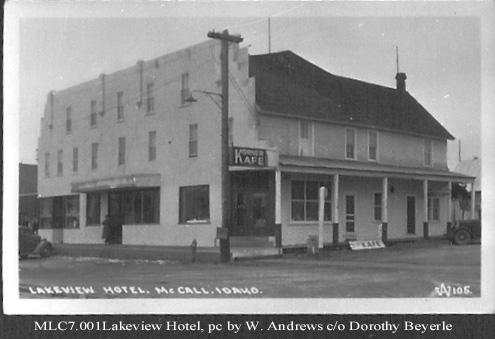
The Korner Kafe opened its doors in November of 1935, offering more than just hot meals – it served up comfort with a side of community. Owned and operated by Mrs. Chester A. Stevens, the café quickly became a staple of McCall’s downtown scene, known for its cozy atmosphere and the kind of home cooking that made you linger a little longer at the table.
The menu was packed with hearty favorites, but it was the homemade pies and pastries that earned a special kind of reverence. Sunday chicken dinners were legendary, and regulars knew they could count on fast service and fair prices, all delivered with a generous helping of warmth. Long before “farm-to-table” was a trend, the Korner Kafe was plating up scratch-made meals that felt like home.
All Aboard: The Arrival of the McCall Train Depot

Before highways shot a straight path into town and summer traffic filled the streets, McCall’s gateway to the outside world came by rail. The McCall Train Depot, now the site of Salmon River Brewery, began its life humbly as a boxcar turned depot.
In 1914, the Idaho Northern Railroad built the rail right through town and locals gathered to witness the spectacle. The machinery, the smoke, the noise…it was all part of something big. McCall was no longer just a lakeside outpost. It was officially on the map.
At first, though, that map was a little confusing. The railroad named the station “Lakeport,” not McCall, causing a minor identity crisis. Tickets printed with “Lakeport” left travelers scratching their heads, and even the U.S. Post Office refused to recognize the name. One frustrated passenger was told, “It’s the same place!” before the railroad finally relented and renamed the station McCall, with a sign proudly reading: “McCall, elevation 5022 feet.”
Though the trains no longer run, the depot’s spirit lives on in the same spot – now filled with the clink of glasses and hum of conversation…and the occasional train whistle blown from the bar.
Goodman’s Café and Service: A One-Stop Cornerstone
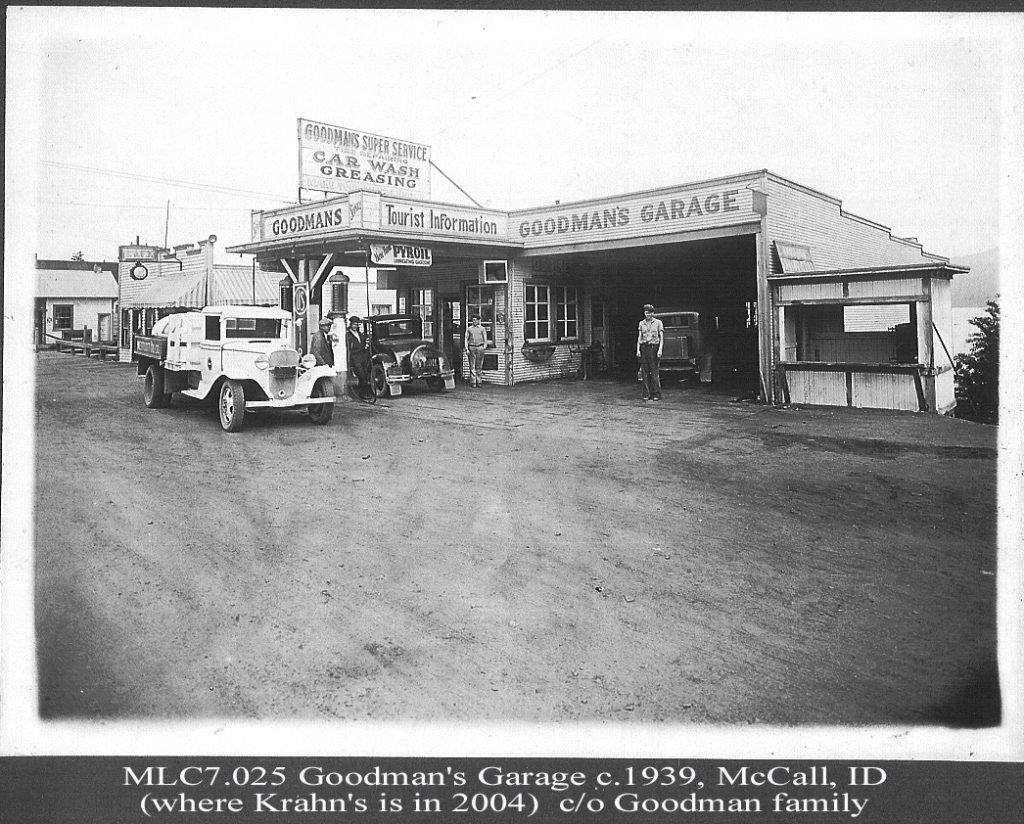
Goodman’s Café and Service was a place where you could fuel your car, your appetite, and maybe your soul, too. Owned and operated by Mr. and Mrs. A.A. Goodman, the business was a true McCall original, offering Conoco gas and Ford dealership services on one side, and down-home cooking on the other.
The café, run by Mrs. Goodman, operated year-round and featured an open-air dining space in the summer that made the most of McCall’s crisp mountain mornings and golden afternoons. Locals came for the hearty breakfasts, hot coffee, and comfort food. According to son Austin Goodman, who was interviewed in 1971, the family originally leased a livery barn and eventually ran the garage in the spot that would later house the Western Store. The café next door operated for about 15 years, closing in 1945 when it was sold and converted into a retail store.
Located where Krahn’s Furniture now stands, Goodman’s was more than just a service station and café – it was a hub. A place where neighbors met, travelers paused, and a slice of pie could fix just about anything.
Roy May Hardware: Built to Last
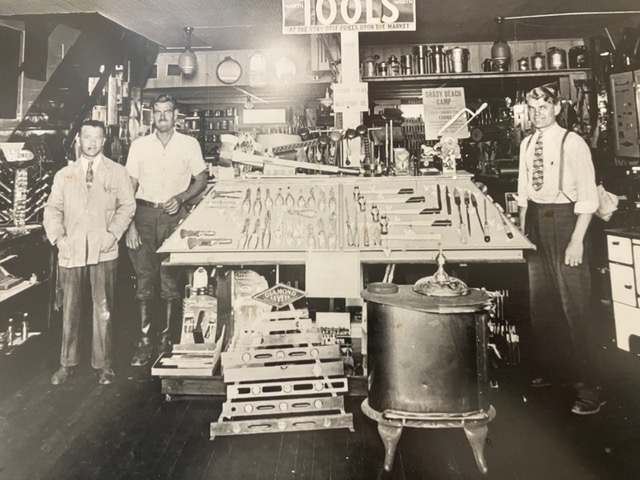
If you needed a hammer, a handful of nails, or just a little neighborly advice, Roy May Hardware was the place to go. Opened in 1934 by Roy May, the store quickly became a cornerstone of downtown McCall. Roy later brought his son-in-law, Wayne Cox, into the business, and together they built more than just inventory – they built trust.
In 1940, the store moved across the street, settling into the location it would call home for over six decades. That spot, right in the heart of town, became synonymous with the May name and with reliable, no-frills service. The shop didn’t just keep up with the times, it modernized. A major remodel in the 1970s came with a grand reopening celebration that was pure Idaho flair: a motion picture on big game hunting and all the fanfare of a town that knew how to support its own.
In 2002, the store relocated to its current site, but the name (and the legacy) are still part of McCall’s small-town fabric and still “more than a hardware store!”
The Original Lakefront Listings
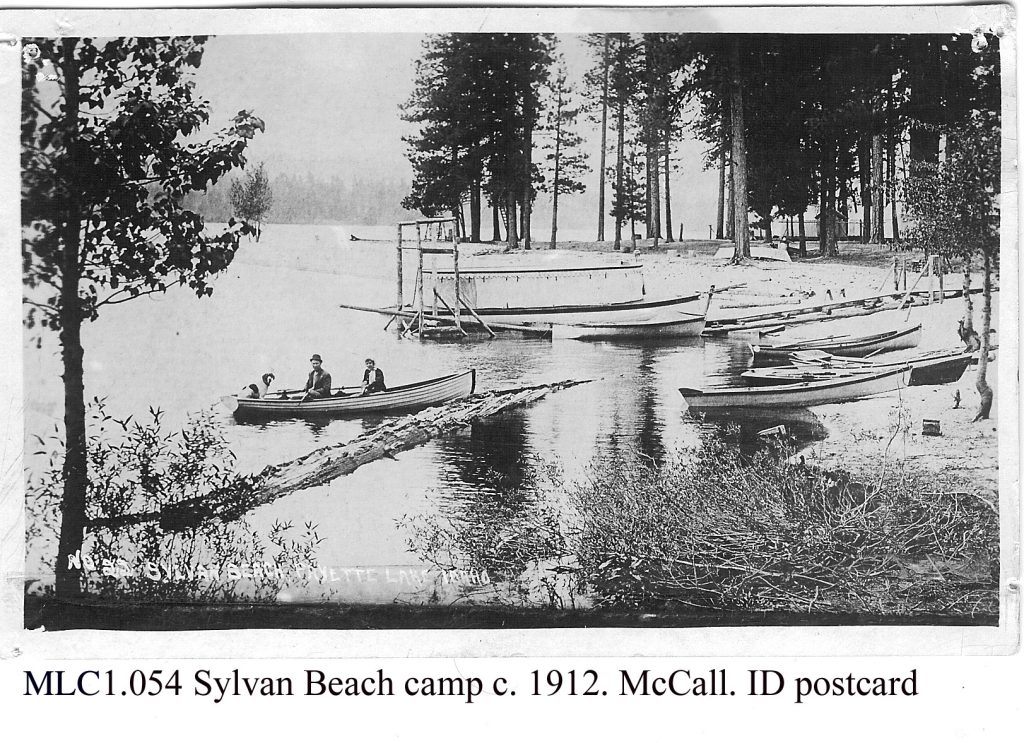
Long before vacation rentals came with smartphone check-ins and hot tub filters, McCall had its own version of the ultimate summer escape: the camp. These weren’t your wilderness survival setups – they were lakeside getaways, complete with cozy cabins, camp kitchens, and enough lake frontage to go around. Think of them as the original VRBOs, booked not with an app, but with a handwritten note and a firm handshake.
Newcomb’s Camps
Run by Mr. and Mrs. G.A. Newcomb, considered true pioneers of lakeside hospitality in McCall, these camps were some of the first to invite vacationers to unwind and settle in. With two locations spanning 600 and 1,000 feet of lakefront respectively, and run with the help of granddaughter Martha McCall, the Newcombs offered 46 tents and five cabins.
Camp Gee-Land
A quarter-mile from downtown, Ted Geelan’s Camp Gee-Land was a bit of everything. It offered cabin rentals, a store stocked with essentials, and a Shell station to gas up before you hit the trail or the lake. With 10 log cabins and 3 tent cabins, this spot mixed practicality with postcard-worthy views. It opened around 1933 and ran like the Swiss Army knife of lakeside stays.
Lakeview Camp
Lakeview Camp was the big one – 65 acres of wooded lakeshore with 57 accommodations, a beach, and a full-on community hall. Run by Mr. and Mrs. E.E. Dean, the camp welcomed guests from 1935 on, offering sandy beaches, summer socials, and even free ice delivery. It was the kind of place you’d stay for a month – and wish you could stay for the season.
Sylvan Beach Camp
Out past town on the west shore along Warren Wagon Road, Sylvan Beach was called a “vacationist’s paradise,” and it earned the title. Operated by Mrs. Allen Webb, this camp offered a mix of modern and semi-modern cabins, plus a dining room known for high-quality meals at prices locals loved. With a perfect perch for swimming, boating, and hiking, Sylvan Beach felt like a private resort, but just rustic enough to still be called a camp.


